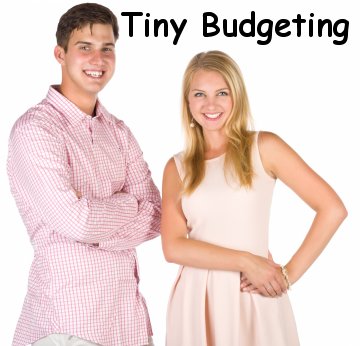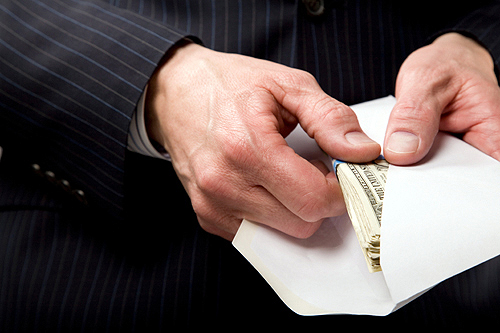Tiny Budgeting: Introduction to a Great Frugal Strategy
Tiny Budgeting is the practice of living on the smallest possible of budgets. Your goal is to incur as few bills as possible. Frankly, getting to “there” from “here” is the biggest problem for anyone who wants to live a frugal lifestyle. By the time you learn about cool ways to save money you’re already feeling “locked” into a more expensive lifestyle. Although you’ll find a million tips on the Internet that help you reduce your expenditures, what you really need to do is reduce your predictable monthly expenses.

Tiny Budgeting begins with categorizing your expenses at two levels. The first level divides everything into one of two categories: “Can’t Avoid This Expense” and “Other Expenses”. You may have some very important other expenses that will plague your budgeting for a few months, maybe even a few years. But “other expenses” should eventually go away. Those first category expenses will always be with you. Here is a short list:
Unavoidable Monthly Expenses
- Housing
- Transportation
- Food
- Utilities
That’s a very simple list, isn’t it? We could break out “Utilities” into Sewage, Trash collection, Electricity (and/or Gas), and Water if that helps you visualize it better.
Every other monthly expense you incur falls into that “Other Expenses” category. That includes clothing, credit cards, medical expenses, etc. You may have some really big bills that Tiny Budgeting rules insist go into the “Other Expenses” category. This won’t work for you if you argue or rationalize how to move something into the Unavoidable Monthly Expenses category.
How Tiny Budgeting Works
The whole idea behind Tiny Budgeting is that somewhere, somehow, you’ll get to the point where you only have Unavoidable Monthly Expenses. Here are the three basic ways you do that:
- You start fresh (you’re young or just got divorced)
- You pay off all your debts
- You declare bankruptcy
It doesn’t matter how you get to the point where you only have Unavoidable Monthly Expenses. That is for you to decide. If you realistically feel it will take two years or five years to get there, that’s okay. You’re not out of the game. Let’s talk about how Tiny Budgeting works first and then we’ll talk about how to use this knowledge regardless of your financial situation.
In a Tiny Budget you choose to pay as little as possible for each of your Unavoidable Monthly Expenses. I will refer to them as UMEs from this point forward. By “as little as possible” I mean only as little as you can arrange without living in poverty. There is no reason to live in poverty if you have a choice about that. You need a clean, healthy home, reliable transportation, good food, and you need proper service for sewage, trash, power, and water.
Housing is the big expense. Whether you buy a home or rent doesn’t matter. In Tiny Budgeting you buy or rent less home than you want but as much as you need. Have you ever watched any of those “Tiny House” television shows? People pay between $40,000 and $80,000 for these really small homes that have a lot of modern conveniences. These are usually couples. A few of them may have a baby. If you’re looking to buy a house and you live alone or just with a spouse, think about how small you can go without wanting to pull your hair out. A one-bedroom studio apartment in a modest neighborhood (maybe a suburb) could save you a lot of money over where you’re living now.
Transportation is the next big expense. You’ll find reams of good advice published all over the Internet. There is no one right way to do this, with one exception: never buy a brand new vehicle. You can buy a Certified Preowned Vehicle and get a good warranty on it. You’ll pay less interest and the vehicle will cost less than the current year version of the same model. There is absolutely no reason to purchase a brand new vehicle, even if you feel you have good trade-in value.
Some guys like to buy pickup trucks. Unless you are very tall or large, or you have a job where you are hauling stuff around all the time you really do not need a pickup truck. Most guys will save money if they buy a certified pre-owned fuel efficient car instead of a pickup truck. Get rid of the pickup truck as soon as you can unless you really, really, truly need it. If you do need a pickup truck then don’t feel guilty. But buy the best possible deal you can. Start with a certified pre-owned pickup truck. Purchase a 6 cylinder unless you really need the power of an 8 cylinder for your job. You don’t need an 8 cylinder just to haul yourself from point A to point B.
Food is the third largest expense in your Tiny Budget. Food is the ultimate UME because some people manage to not pay for housing at all but they still have to eat. You should eat a healthy diet but you can save a lot of money by never eating out again. Don’t worry, you can eat out again. But you should train yourself to be self-sufficient. Learn to cook a few meals. Learn some basic nutrition so that you make better choices when you do eat out.
The less you pay for food the better. But don’t buy cheap food that tastes awful or ruins your health. Use good judgment. Begin by keeping a food diary. Research shows that when people keep food and expense diaries they learn to make better choices. They become more aware of how wasteful their habits are.
Tiny Budgeting Requires Incidental Expenses to Be Necessary
You’re allowed to have a television when you use Tiny Budgeting. But explain why you need a $3000 60-inch hi-def curved television with today’s technology. You don’t have to explain that to me; explain it to yourself.
You want the big ticket items but you can get a decent 50-inch TV these days for less than $300. When you can buy a decent item for 10% of the top ticket price, you don’t need to pay top dollar. Quality goes a long way but electronics is one area where the price of everything is constantly coming down. Save your money and learn to live with a 50 inch 1080p flat screen television for a few more years.
You’re allowed to buy shoes, even new shoes. But you don’t need expensive shoes for every phase of life. Buy a pair of shoes for work and a pair of shoes for leisure activities. Budget for new shoes about once per year.
If you think your Coach or Dooney and Burke collection is inadequate, you’re not ready for Tiny Budgeting. The Home Shopping Network and QVC are not your friends unless your vacuum cleaner breaks down and they offer a model at a steep discount compared to what you’ll pay in the store and online.
Tiny Budgeting Allows You to Be Flexible
You may want to live closer to where you work. Allowing for the possibility that you could lose your job in the future, there are indeed some advantages to living close to work. You’ll spend less time commuting, which puts more time into your day. You’ll be better rested when you get to work and that should help you be more productive. And you should be able to spend less on transportation. If you can walk to work then you don’t need a car all the time. And now we have ride-hailing alternatives to taxis (I’m talking about Lyft and Uber). If you can’t take the bus everywhere you can still travel by car when you need to.
If you choose to spend more on housing you can get some of that back from transportation, but not much. Don’t sacrifice on food to pay for housing or transportation.
If you choose to spend more on transportation then you can get some of that back from housing. It is easier to be flexible on housing if you’re not going to be flexible on transportation.
Remember: with Tiny Budgeting you always have some flexibility. Make choices you can live with. And make choices for finite periods of time. You can choose to live a certain lifestyle for 1, 2, or 3 years and then reassess where you are at the end of each year. You don’t have to commit to living in less expensive housing for the rest of your life. If your family grows you’ll need a bigger place. Plan for it.
Start Using Tiny Budgeting Right Away
Let’s say you’re paying off 8 credit cards, two signature loans, 2 auto loans, and a huge mortgage on a four-bedroom house. You don’t have to wait until you get all that paid off to start using Tiny Budgeting.
Tiny Budgeting principles are easy to remember: You only pay for what you need, which is less than what you typically want.
Your flexibility with Tiny Budgeting begins with the UMEs at any point in your life. As soon as you can afford to move or change transportation you should do so.
You can always review your food purchases and start keeping a food diary at any time. So there is no reason to delay working on the food part of your UME.
And you can find ways to reduce the amount of money you spend on utilities. I’ve shared plenty of great ideas on this blog.
Because Tiny Budgeting is very flexible you can easily phase into it. You’re not as locked into an expensive lifestyle as you think.
And Tiny Budgeting works with those incidental or “other” expenses in many ways. I’ll discuss that in my next article.


